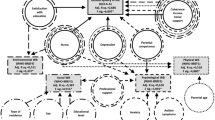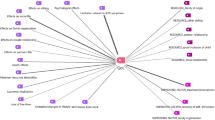Abstract
We conducted a quasi-experimental study to test the effects of “the empowerment program for parents of adults with autism spectrum disorder” by Kawada and Nojima (J Kochi Women’s Univ Acad Nurs 44(1):43–55, 2018). The program has been developed on the theoretical premises of the family empowerment model and the andragogy model. The subjects were 36 parents of adults with high-functioning autistic spectrum disorder; 21 parents in the intervention group, and 15 parents in the control group. Outcome measures were the family empowerment scale (FES) modified by the author, the general health questionnaire-28 (GHQ-28), and the short form-36 health survey version 2 (SF36-2). The results showed significant differences (p < 0.05) in some items: the FES item of “family,” the GHQ-28 items of “overall” and “anxiety/insomnia,” and the SF36-2 items “vitality” and “mental health.” This program had a positive impact on the improvement of empowerment, mental health condition, and the quality of life of parents.

Similar content being viewed by others
References
Taylor JL, Hodapp RM, Burke MM, Waitz-Kudla SN, Rabideau C. Training parents of youth with autism spectrum disorder to advocate for adult disability services: results from a pilot randomized controlled trial. J Autism Dev Disord. 2017;47(3):846–57. https://doi.org/10.1007/s10803-016-2994-z.
Chamak B, Bonniau B. Trajectories, long-term outcomes and family experiences of 76 adults with autism spectrum disorder. J Autism Dev Disord. 2016;46(3):1084–95. https://doi.org/10.1007/s10803-015-2656-6.
Howlin P, Goode S, Hutton J, Rutter M. Adult outcome for children with autism. J Child Psychol Psychiatry. 2004;45(2):212–29. https://doi.org/10.1111/j.1469-7610.2004.00215.x.
Kondo N. Guidelines on support networks for adolescents and adults with developmental disorders. Health Labour Sciences Research; comprehensive research project for persons with disabilities (physical and intellectual disabilities), Study on current situation of effective support and networks for adolescents and adults with developmental disorders; guidelines for support, FY2011 Research Report, Ministry of Health, Labour and Welfare. 2011. Available from: https://www.khj-h.com/wp/wp-content/uploads/2018/05/rehab_go.pdf. Cited May 15, 2019.
Hanley-Maxwell C, Whitney-Thomas J, Pogoloff SM. The second shock: a qualitative study of parents’ perspectives and needs during their child’s transition from school to adult life. J Assoc Persons Severe Handicaps. 1995;20(1):3–15. https://doi.org/10.1177/154079699502000102.
Kondo N, Kiyota Y, Kitabata Y, Kuroda A, Kurosawa M, Sakaizumi H, Fujimiya S, et al. Study on awareness of the actual status of psychiatric disorders in withdrawn adolescents. Study on understanding actual status of psychiatric disorders causing withdrawal during adolescence and development of a psychiatric therapy/aid system (Chief Researcher: Saito K), FY2009 Summary/Shared Research Report (Health and Labor Sciences Research; Mental Health Science Research Project). 2010. Available from: http://www.ncgmkohnodai.go.jp/subject/100/h21-jidouseisin.pdf, 67-102.
Shattuck PT, Wagner M, Narendorf S, Sterzing P, Hensley M. Post-high school service use among young adults with an autism spectrum disorder. Arch Pediatr Adolesc Med. 2011;165(2):141–6. https://doi.org/10.1001/archpediatrics.2010.279.
Tsujii M. Research on effective development and dissemination of family support services for children with developmental disorder. Supervisory Research Report; 2010. pp. 1–39.
Kato K, Matsumoto H. Developmental disorders in adulthood. Japanese. J Clin Psychol Extra Ed. 2010;2:88–93.
Nakata Y. What is parent training? ASP Heart. 2008;18:12–7.
Marsack CN, Samuel PS. Mediating effects of social support on quality of life for parents of adults with autism. J Autism Dev Disord. 2017;47(8):2378–89. https://doi.org/10.1007/s10803-017-3157-6.
Ozaki M. Family support in adulthood and its difficulties. Jpn J Dev Disabil. 2010;3:104–8.
Kawada M, Nojima S. Development of an empowerment program for parents of adults with autism spectrum disorder. J Kochi Women’s Univ Acad Nurs. 2018;44(1):43–55.
Nojima S. Trends and issues of research on empowerment. Jpn J Nurs Res. 1996;29(6):3–14.
Weiss JA, Cappadocia MC, MacMullin JA, Viecili M, Lunsky Y. The impact of child problem behaviors of children with ASD on parent mental health: the mediating role of acceptance and empowerment. Autism. 2012;16(3):261–74. https://doi.org/10.1177/1362361311422708.
Weiss JA, MacMullin JA, Lunsky Y. Empowerment and parent gain as mediators and moderators of distress in mothers of children with autism spectrum disorders. J Child Fam Stud. 2015;24(7):2038–45. https://doi.org/10.1007/s10826-014-0004-7.
Smith LE, Greenberg JS, Seltzer MM. Social support and well-being at mid-life among mothers of adolescents and adults with autism spectrum disorders. J Autism Dev Disord. 2012;42(9):1818–26. https://doi.org/10.1007/s10803-011-1420-9.
Kawada M, Okada S, Katayama T, Nojima S. Supporting the family of adults with high-functioning autistic spectrum disorder; analysis of interview focusing on the needs of the family. J Kochi Women’s Univ Acad Nurs. 2017;43(1):140–50.
Nojima S, Nakano A, editors. Nursing practice bringing family empowerment. Japan: Herusu Shuppan; 2005.
Knowles MS. The modern practice of adult education: from pedagogy to andragogy. 2nd ed. Englewood Cliffs: The Adult Education Company; 1980.
Rodgers BL, Knafl K. Concept analysis. An evolutionary view. Concept development in nursing foundations, techniques and applications. 2nd ed. Techniques and applications; 2002. pp. 77–102.
Constantino JN, Todd RD. Intergenerational transmission of subthreshold autistic traits in the general population. Biol Psychiat. 2005;57(6):655–60. https://doi.org/10.1016/j.biopsych.2004.12.014.
Kamio Y, Tsujii H, Inada N, Inokuchi E, Kuroda M, Koyama T, Uno Y, Okudera T, Ichikawa H, Takaki A. Validation of the Japanese version of the social responsiveness scale: a comparison with PDD-Autism Society Japan Rating Scales (PARS). Clin Psychiatry. 2009;51(11):1101–9. https://doi.org/10.11477/mf.1405101524.
Koren PE, DeChillo N, Friesen BJ. Measuring empowerment in families whose children have emotional disabilities: a brief questionnaire. Rehab Psychol. 1992;37(4):305–21. https://doi.org/10.1037/h0079106.
Wakimizu R, Fujioka H, Furuya K, Miyamoto S, Iejima A, Yoneyama A. Exploration of related factors of family empowerment for families rearing children with developmental disorders in Japan, with the family empowerment scale (FES) Japanese version. J Health Welf Stat. 2010;57(13):33–41.
Vandiver VL, Jordan C, Keopraseuth K, Yu M. Family empowerment and service satisfaction: an exploratory study of Laotian families who care for a family member with mental illness. Psychiatr Rehabil J. 1995;19(1):47–54. https://doi.org/10.1037/h0095460.
Ducharme F, Lévesque L, Lachance L, Giroux F, Legault A, Préville M. Taking care of myself. Dementia. 2005;4(1):23–47. https://doi.org/10.1177/1471301205049189.
Goldberg DP. Manual of the general health questionnaire. Windsor: NFER-Nelson; 1978.
Nakagawa Y, Daibo I. Japanese version of GHQ mental health questionnaire guide, Tokyo, Japan. Tokyo: Nihon Bunka Kagakusha Co., Ltd; 1996.
Samadi SA, McConkey R, Kelly G. Enhancing parental well-being and coping through a family-centred short course for Iranian parents of children with an autism spectrum disorder. Autism. 2013;17(1):27–43. https://doi.org/10.1177/1362361311435156.
Hastings RP, Kovshoff H, Brown T, Ward NJ, Espinosa FD, Remington B. Coping strategies in mothers and fathers of preschool and school-age children with autism. Autism. 2005;9(4):377–91. https://doi.org/10.1177/1362361305056078.
Pottie CG, Ingram KM. Daily stress, coping, and well-being in parents of children with autism: a multilevel modeling approach. J Fam Psychol. 2008;22(6):855–64. https://doi.org/10.1037/a0013604.
Fukuhara S, Suzukamo Y. Mamual of SF-36v2. Japanease version. Kyoto: Ihope Inc.; 2004. p. 2015.
Higashi M. What is desired from child clinical psychiatry to adult clinical practice? From a medical viewpoint. Jpn J Clin Psychiatry. 2008;37(2):1571–9.
Kondo N. Cases of developmental disorder in adolescence and adulthood and family support. Jpn J Family Therapy. 2012;29(2):121–6.
Mugno D, Ruta L, D’arrigo VG, Mazzone L. Impairment of quality of life in parents of children and adolescents with pervasive developmental disorder. Health Qual Life Outcomes. 2007;5:22. https://doi.org/10.1186/1477-7525-5-22.
Dixon LB, Lucksted A, Medoff DR, Burland J, Stewart B, Lehman AF, et al. Outcomes of a randomized study of a peer-taught family-to-family education program for mental illness. Psychiatr Serv. 2011;62(6):591–7. https://doi.org/10.1176/ps.62.6.pss6206_0591.
Motegi Y, Muto T. Current status of analog research on defusion/exercise and issues. Doshisha Clin Psychol Therapy Res. 2012;2(1):81–91.
Muto T. ACT handbook-mindful approach by clinical behavior analysis. Tokyo: Seiwa Shoten Publishers; 2011.
Sonoda J. What is ACT? Journal of Kibi International University; 2010. Available from: https://kiui.jp/pc/clinical/kiyou/data/pdf2010/02_2.pdf. Institute of Clinical Psychology, pp. 45–50.
Howlin P, Alcock J, Burkin C. An 8 year follow-up of a specialist supported employment service for high-ability adults with autism or Asperger syndrome. Autism. 2005;9(5):533–49. https://doi.org/10.1177/1362361305057871.
Howlin P, Moss P. Adults with autism spectrum disorders. Can J Psychiatry Revue Canadienne de Psychiatrie. 2012;57(5):275–83. https://doi.org/10.1177/070674371205700502.
Lawer L, Brusilovskiy E, Salzer MS, Mandell DS. Use of vocational rehabilitative services among adults with autism. J Autism Dev Disord. 2009;39(3):487–94. https://doi.org/10.1007/s10803-008-0649-4.
Nomura K, Tsujii M, Matsuoka M. Study on depression in pervasive highly functional developmentally disabled children; study on development and dissemination of effective family support service for children with developmental disorder. Comprehensive Research Report; 2010. pp. 93–113.
Carter AS, Martínez-Pedraza FL, Gray SA. Stability and individual change in depressive symptoms among mothers raising young children with ASD: maternal and child correlates. J Clin Psychol. 2009;65(12):1270–80. https://doi.org/10.1002/jclp.20634.
Ingersoll B, Hambrick DZ. The relationship between the broader autism phenotype, child severity, and stress and depression in parents of children with autism spectrum disorders. Res Autism Spectr Disord. 2011;5(1):337–44. https://doi.org/10.1016/j.rasd.2010.04.017.
Acknowledgements
We would like to express our sincere gratitude to my families, participants, and supporters of this study. We would also like to express my sincere gratitude and deep appreciation to Dr. Hiroko Azechi, Professor at University of Kochi, Dr. Masako Tai, Professor at University of Kochi, Dr. Takashi Okada, Associate Professor at Nagoya University Hospital, and Associate Dr. Takafumi Katayama, Associate Professor at University of Hyogo. The authors would like to thank Junko Nasu, a lecturer in Kyoto University of Advanced Science, and Enago (www.enago.jp) for the English language. This paper is part of a doctoral dissertation submitted to the Graduate School of Nursing, University of Kochi.
Funding
This work was supported by JSPS KAKENHI (Grant Nos. JP18K10285, JP24593509).
Author information
Authors and Affiliations
Contributions
KAWADA: Intervention, Data Collection, Analysis, Discussion. NOJIMA: Analysis, Discussion.
Corresponding author
Ethics declarations
Conflict of interest
The authors declare that they have no conflict of interest.
Ethical Approval
This research was carried out with the approval of The Research Ethics Committee of Research Institute of Nursing Care for People and Community, the College of Nursing Art and Science, the University of Hyogo.
Informed Consent
Informed consent was obtained from all individual participants included in the study.
Additional information
Publisher's Note
Springer Nature remains neutral with regard to jurisdictional claims in published maps and institutional affiliations.
Rights and permissions
About this article
Cite this article
Kawada, M., Nojima, S. Evaluating the Effects of the Empowerment Program for Parents of Adults with High-Functioning Autistic Spectrum Disorder. J. Psychosoc. Rehabil. Ment. Health 7, 27–44 (2020). https://doi.org/10.1007/s40737-020-00155-y
Received:
Accepted:
Published:
Issue Date:
DOI: https://doi.org/10.1007/s40737-020-00155-y
Keywords
- Autistic spectrum disorder
- Family empowerment scale
- General health questionnaire-28
- Empowerment
- Parents of adults with high-functioning autistic spectrum disorder
- Quasi-experimental study




